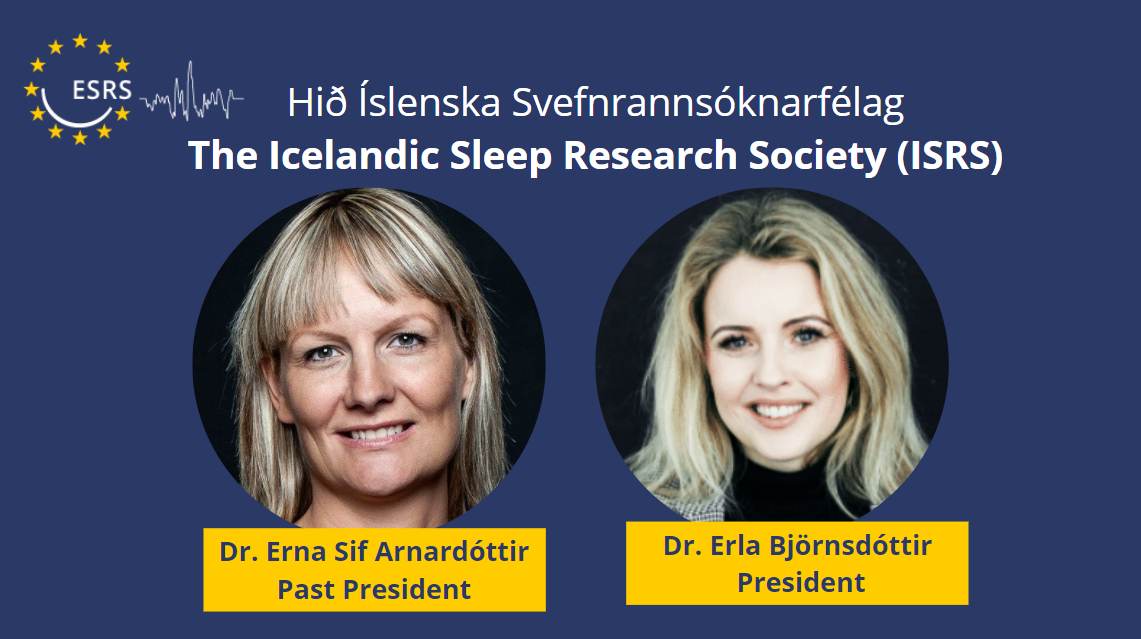Sleep Science Friday: Updates from the Icelandic Sleep Research Society
There has recently been a change in the leadership structure of the Icelandic Sleep Research Society (Hið Íslenska Svefnrannsóknarfélag), with Dr. Erna Sif Arnardóttir, Assistant Professor, Department of Engineering, Reykjavik University), passing on the baton to Dr. Erla Björnsdóttir, Managing Director of Better Sleep (Betri Svefn), after 10 years as President.
Dr. Björnsdóttir, who also served on the board for the duration of Dr. Arnardóttir’s presidency is well equipped to lead the society for the next (hopefully 10) years. In an interview with both, they share some insight on the foundation of the society, some of their recent activities and initiatives, the state of sleep research and sleep medicine in Iceland and what the future holds.
Development of the Society
The ISRS proudly holds the title of having the largest sleep research society in Europe (per capita), with over 100 members for a nation of 366,425 inhabitants. It was founded in 1987, but became dormant after some time. And it was at the Nordic Sleep Society meeting in 2011 that it was ‘awoken‘ once more, under the leadership of then President Dr. Arnardóttir. She credits the success and growth of the society since then to the establishment of monthly lunch talks on a wide variety of topics, from speakers within the society or from abroad.
Sleep Education in Iceland
While this initiative has been a constant feature of the society since its rebirth, new President Dr. Björnsdóttir is seeking to shake things up a bit. She proposes reducing the number of the aforementioned meetings, and using those resources to focus on targeting the general population on improving their sleep habits through sleep education.
Dr. Björnsdóttir noted that this sleep education campaign will continue to be a major initiative of the society especially with children from as young as primary school age. To do this, the society has been working on a battery of educational material (in Icelandic) and making this available to schools across the country, so that the teachers themselves can conduct these trainings. This has also been supported by a digital media campaign in October 2021, involving online lectures on specific topics and social media.
Sleep Medicine in Iceland
While developing the sleep education of the general population is of critical importance, so is the state of sleep education among medical practitioners. Both Drs. Arnardóttir and Björnsdóttir have been actively teaching electives at the university level, but noted that this is by far not sufficient. Dr. Arnardóttir stressed the need for an EU-wide syllabus outlining what needs to be known about sleep in different professions.
However, in the absence of a dedicated sleep curriculum in Iceland (currently only sports medicine benefits from a 3-week course), the recently published Sleep Medicine Textbook 2nd Ed. should be utilized so that medical practitioners can improve their knowledge of sleep, even without needing to specialize in it.
Needless to say, it has been, and still is the hope of both to have an established sleep medicine program in Iceland.
Future Relevance of Sleep Research in Iceland
In spite of an increasing trend of energy drink (caffeine) and screen time usage, Drs. Arnardóttir and Björnsdóttir are optimistic that with their educational campaign happening in schools from early on that they’ll start to counteract these lifestyle habits.
During the interview, they also spoke about the future of sleep research and sleep medicine, touching on which topics and initiatives would be most relevant in Iceland.
Additionally, the ongoing Sleep Revolution project is already receiving some positive interest, with seven times more people applying to join the study than anticipated. According to Dr. Arnardóttir, „people want to sleep better“. And having this motivation serves as encouragement that there is and will be a need for more sleep research projects and initiatives in Iceland.
Listen to their interview to get even more details on the Iceland Sleep Research Society.
ESRS Announcements
ESRS Funding Opportunities
Recent publications from ESRS members
- van den Broek et al. (2021). What is in a name? Definitions of insomnia in people with intellectual disabilities. J Appl Res Intellect Disabil.
- Bódizs et al. (2021). Sleep-spindle frequency: Overnight dynamics, afternoon nap effects, and possible circadian modulation. J Sleep Res.
- Skeldon et al. (2021). Extracting Circadian and Sleep Parameters from Longitudinal Data in Schizophrenia for the Design of Pragmatic Light Interventions. Schizophr Bull.
- Bijlenga et al. (2021). Comparing objective wakefulness and vigilance tests to on-the-road driving performance in narcolepsy and idiopathic hypersomnia. J Sleep Res.
- Åkerstedt et al. (2021). Sleep duration and mortality, influence of age, retirement, and occupational group. J Sleep Res.
- Riedel et al. (2021). Sleep-Disordered Breathing is frequently associated with idiopathic normal pressure hydrocephalus but not other types of hydrocephalus. Sleep.




